We have decided to back up the original source material from NO-MAAM in the event that more is lost over time.

Chapter Two: Sexuality
Part 6: You’re Such a Tool! (Briffault’s law)
 One thing our society struggles with as it continually fails feminism’s cultural fitness tests is the silly notion that men and women are “equal” and thus we are essentially coming at each-other from the same point of view regarding our interactions with the opposite sex. This is the wrong way of thinking. We are not “blank slates” who are different merely because of society’s externally imposed social constructs upon us.
One thing our society struggles with as it continually fails feminism’s cultural fitness tests is the silly notion that men and women are “equal” and thus we are essentially coming at each-other from the same point of view regarding our interactions with the opposite sex. This is the wrong way of thinking. We are not “blank slates” who are different merely because of society’s externally imposed social constructs upon us. In fact, anyone who believes in evolution would scoff at the idea of men and women being essentially the same. Natural Selection is what “evolves” us. Sharks mate with the fastest swimmers and the sharks best able to feed themselves. By selecting those with the genes which display these traits, they continually evolve to become better swimmers and better predators. Animals evolve to do the tasks which they are best suited for. Thus, the sharks of today are likely “better” sharks than the sharks of 10,000 years ago as the genes of those best at survival continually get passed on more often than those who fail to survive.
In fact, anyone who believes in evolution would scoff at the idea of men and women being essentially the same. Natural Selection is what “evolves” us. Sharks mate with the fastest swimmers and the sharks best able to feed themselves. By selecting those with the genes which display these traits, they continually evolve to become better swimmers and better predators. Animals evolve to do the tasks which they are best suited for. Thus, the sharks of today are likely “better” sharks than the sharks of 10,000 years ago as the genes of those best at survival continually get passed on more often than those who fail to survive.
Between the sexes, we also evolve to do the tasks which we are best suited for. You can see that men and women are physically different, each being designed for what they do best. Certainly there are some social constructs that society imposes upon men and women, but they are based on our biological natures, not upon the blank slate.
 In women’s case, their entire bodies are designed for giving birth and caring for children. They have wide hips to give birth and have breasts to feed children with. Note that it is also these traits – women’s “curves” – that are a large part of what men find sexually attractive in women. It is their “reproductive features” we find attractive. Further, even a woman’s mind has evolved to make her more suitable for rearing children, thus a woman’s “multi-tasking brain” is more suitable to care for children – or to do other tasks while also caring for children. But it goes even further than this multi-tasking feature. Women are somewhere in between that of a man and a child. Often times, the men of old observed women were merely children of a larger growth:
In women’s case, their entire bodies are designed for giving birth and caring for children. They have wide hips to give birth and have breasts to feed children with. Note that it is also these traits – women’s “curves” – that are a large part of what men find sexually attractive in women. It is their “reproductive features” we find attractive. Further, even a woman’s mind has evolved to make her more suitable for rearing children, thus a woman’s “multi-tasking brain” is more suitable to care for children – or to do other tasks while also caring for children. But it goes even further than this multi-tasking feature. Women are somewhere in between that of a man and a child. Often times, the men of old observed women were merely children of a larger growth: Women have mentally “evolved” to be something intermediate between the child and the man. We have all heard that women are more emotional than men and are more “in tune with feelings” than men. And this is correct, for tell me, how do infants communicate except through the language of emotions and feelings? How does a baby indicate it needs to be fed? It is through the emotional response of crying – certainly not by saying, “Hey momma, bring those soft, round milk thingies over to my mouth.” Children communicate emotionally, and since women have evolved to become “better carers of children,” they have also evolved to be more in tune to the language of children, which is emotion.
Women have mentally “evolved” to be something intermediate between the child and the man. We have all heard that women are more emotional than men and are more “in tune with feelings” than men. And this is correct, for tell me, how do infants communicate except through the language of emotions and feelings? How does a baby indicate it needs to be fed? It is through the emotional response of crying – certainly not by saying, “Hey momma, bring those soft, round milk thingies over to my mouth.” Children communicate emotionally, and since women have evolved to become “better carers of children,” they have also evolved to be more in tune to the language of children, which is emotion.
“… Because the female connections link the left hemisphere, which is associated with logical thinking, with the right, which is linked with intuition, this could help to explain why women tend to do better than men at intuitive tasks, she added. “Intuition is thinking without thinking. It’s what people call gut feelings. Women tend to be better than men at these kinds of skills which are linked with being good mothers,”…” (Source)
We also often hear that girls mature faster than boys. This is also true, and to refer back to Schopenhauer again, he acknowledges this as well:
Man reaches the maturity of his reasoning and mental faculties scarcely before he is eight-and-twenty; woman when she is eighteen; but hers is reason of very narrow limitations. This is why women remain children all their lives, for they always see only what is near at hand, cling to the present, take the appearance of a thing for reality, and prefer trifling matters to the most important. — Arthur Schopenhauer, On Women
 The reason girls mature mentally before boys again goes back to their biological function as the bearers of children. Everywhere in nature, when an animal is physically capable of giving birth it is also mentally developed enough to care for its offspring – at least in the most primal of ways. This is also true of human females. When they reach puberty, they are mentally mature enough to give at minimum the basic care to an infant to keep it alive. Even though we don’t encourage girls to have children as soon as they reach puberty, we do see in our culture that adults begin to trust girls at the age of puberty for tasks such as babysitting, thus lots of girls in the 12 to 14 age group begin to earn some pocket money in this manner – they have become mentally mature enough to adequately do the task. Why does Schopenhauer indicate women reach the maturity of their reasoning and mental faculties at the age of eighteen? Well, what would be the evolutionary advantage to women growing out of this phase of relating to children and beyond it? There is none.
The reason girls mature mentally before boys again goes back to their biological function as the bearers of children. Everywhere in nature, when an animal is physically capable of giving birth it is also mentally developed enough to care for its offspring – at least in the most primal of ways. This is also true of human females. When they reach puberty, they are mentally mature enough to give at minimum the basic care to an infant to keep it alive. Even though we don’t encourage girls to have children as soon as they reach puberty, we do see in our culture that adults begin to trust girls at the age of puberty for tasks such as babysitting, thus lots of girls in the 12 to 14 age group begin to earn some pocket money in this manner – they have become mentally mature enough to adequately do the task. Why does Schopenhauer indicate women reach the maturity of their reasoning and mental faculties at the age of eighteen? Well, what would be the evolutionary advantage to women growing out of this phase of relating to children and beyond it? There is none.
But then, what is it that men have evolved to become?
 Once we realize that everywhere in nature the male is the sexual servant of the female, it’s pretty easy to see the plot of evolution: Men have evolved to become the best providers and protectors we can possibly be in order to meet the needs of the female – especially during her most vulnerable time, which is when she gets pregnant, gives birth, recuperates, and then raises the child until it becomes self-sufficient (ie. It can walk, talk and feed itself). This whole process takes about four years to complete, and then her rotating polyandry cycle kicks in and she discards the male in order to seek out a new man to repeat the cycle again. This is the primitive method of assuring genetic diversity amongst her offspring, which increases their overall chance of survival.
Once we realize that everywhere in nature the male is the sexual servant of the female, it’s pretty easy to see the plot of evolution: Men have evolved to become the best providers and protectors we can possibly be in order to meet the needs of the female – especially during her most vulnerable time, which is when she gets pregnant, gives birth, recuperates, and then raises the child until it becomes self-sufficient (ie. It can walk, talk and feed itself). This whole process takes about four years to complete, and then her rotating polyandry cycle kicks in and she discards the male in order to seek out a new man to repeat the cycle again. This is the primitive method of assuring genetic diversity amongst her offspring, which increases their overall chance of survival. So aside from merely being sperm donors, men have also evolved into being the best at what we do – and these are also the things women find attractive in a man: our protecting and providing skills. We have developed upper body strength which is vastly superior to the female’s, and so it is tall, strong, broad shouldered men which women find sexually attractive. Men have developed linear thinking brains which help us figure out how to perform specific tasks as efficiently and productively as possible. No matter what men set out to do, aside from raising children, women cannot compete with men on a level playing field because we have evolved to best perform our tasks in order to make ourselves useful to women. Most women admit that they are sexually attracted to men who are more intelligent than they are – this does not mean that all men are are smarter than all women, but merely that each woman tends to seek out a man who has higher intelligence than she possesses.
So aside from merely being sperm donors, men have also evolved into being the best at what we do – and these are also the things women find attractive in a man: our protecting and providing skills. We have developed upper body strength which is vastly superior to the female’s, and so it is tall, strong, broad shouldered men which women find sexually attractive. Men have developed linear thinking brains which help us figure out how to perform specific tasks as efficiently and productively as possible. No matter what men set out to do, aside from raising children, women cannot compete with men on a level playing field because we have evolved to best perform our tasks in order to make ourselves useful to women. Most women admit that they are sexually attracted to men who are more intelligent than they are – this does not mean that all men are are smarter than all women, but merely that each woman tends to seek out a man who has higher intelligence than she possesses.
But ultimately, men do all of these things in service of women, in the hopes of gaining – or maintaining – her favor. However, the kink in this plot is that women don’t actually “love” men, only gay men truly love men. Rather women love being loved. “Love” means different things to men and women.
“Women have no sympathy… And my experience of women is almost as large as Europe. And it is so intimate too. Women crave for being loved, not for loving. They scream at you for sympathy all day long, they are incapable of giving you any in return for they cannot remember your affairs long enough to do so.” — Florence Nightingale
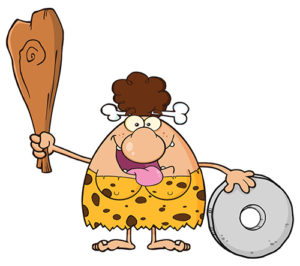 Think of a man as a stick in a woman’s hand – a tool which she uses for her own purposes. The woman with the biggest stick will fare better in society than women with smaller sticks – or especially women with no sticks at all. This is a further reason for women to give men fitness tests – to test how strong of a stick he is. If she finds him sufficiently strong, she will begin to conform herself to him, creating the illusion that she is his ideal mate so that he will begin to fall in love with her and thus become useful to her as a “tool.”
Think of a man as a stick in a woman’s hand – a tool which she uses for her own purposes. The woman with the biggest stick will fare better in society than women with smaller sticks – or especially women with no sticks at all. This is a further reason for women to give men fitness tests – to test how strong of a stick he is. If she finds him sufficiently strong, she will begin to conform herself to him, creating the illusion that she is his ideal mate so that he will begin to fall in love with her and thus become useful to her as a “tool.”“When I started researching this book, I was prepared to rediscover the old saw that conventional femininity is nurturing and passive and that masculinity is self-serving, egotistical, and uncaring. But I did not find this. One of my findings here is that manhood ideologies always include a criterion of selfless generosity, even to the point of sacrifice. Again and again we find that ‘real’ men are those who give more than they take.” — David Gilmore in his 1990 book Manhood in the Making
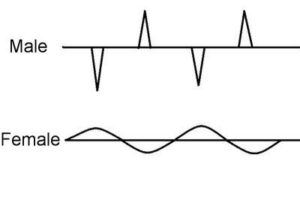 This rarely happens the other way around. While there is an evolutionary survival advantage for the female to lose interest in a man after completing her four year rotating polyandry cycle, there is no similar advantage for the man to lose interest. In fact, just the opposite. It is in both her and her offspring’s advantage to have the man still hopelessly in love with her, providing and protecting his brains out while she slyly seeks out her next suitable mate before giving the present “tool” his walking papers.
This rarely happens the other way around. While there is an evolutionary survival advantage for the female to lose interest in a man after completing her four year rotating polyandry cycle, there is no similar advantage for the man to lose interest. In fact, just the opposite. It is in both her and her offspring’s advantage to have the man still hopelessly in love with her, providing and protecting his brains out while she slyly seeks out her next suitable mate before giving the present “tool” his walking papers. It is also important to note the corollaries to Briffault’s law:
1 – Past benefit provided by the male does not provide for continued or future association.
2 – Any agreement where the male provides a current benefit in return for a promise of future association is null and void as soon as the male has provided the benefit (see corollary 1)
3 – A promise of future benefit has limited influence on current/future association, with the influence inversely proportionate to the length of time until the benefit will be given and directly proportionate to the degree to which the female trusts the male (which is not bloody likely).
 Briffault’s law is the reason the most important word a man must learn in his relationships with a woman is “No!” If a man keeps nothing for himself and simply gives it all to her, she has no reason to continue to associate with him. No matter what he does, it soon will become “What have you done for me lately?” He must keep the benefits he bestows upon her under his control, and learn to say no often, as she will naturally try to get him to pass them on to her. No, I won’t spend $100 for roses on Valentine’s Day. No, we’re not going to Hawaii for a vacation (unless you are paying, Toots!) No, you cannot move in with me. No, you cannot move in now that you’ve been evicted – that is what your girlfriend’s couch or your parent’s spare room is for. NO! We won’t get be getting married. No! You are not going on the pill so we can have bareback sex. No! No! No! No! No! NO!
Briffault’s law is the reason the most important word a man must learn in his relationships with a woman is “No!” If a man keeps nothing for himself and simply gives it all to her, she has no reason to continue to associate with him. No matter what he does, it soon will become “What have you done for me lately?” He must keep the benefits he bestows upon her under his control, and learn to say no often, as she will naturally try to get him to pass them on to her. No, I won’t spend $100 for roses on Valentine’s Day. No, we’re not going to Hawaii for a vacation (unless you are paying, Toots!) No, you cannot move in with me. No, you cannot move in now that you’ve been evicted – that is what your girlfriend’s couch or your parent’s spare room is for. NO! We won’t get be getting married. No! You are not going on the pill so we can have bareback sex. No! No! No! No! No! NO!
There were only a few thousand divorces annually in the mid-nineteenth century when divorce cost wives their children and Dad’s paycheck. This family stability began eroding as later nineteenth century divorce courts, under pressure from the rising feminist movement, began awarding child custody to mothers. — Daniel Amneus, The Case for
Father Custody, p360
“Between 1870 and 1920 the divorce rate rose fifteenfold, and by 1924 one marriage out of seven ended in divorce” — James H. Jones, Alfred Kinsey: A Public/Private Life (New York: W. W. Norton, 1997), p.292.
Women’s attitude to men is easiest to understand by comparing it to our attitude towards a job. Whether we love our job or not, most of us think we must have one. We often think a bad job is better than not having a job at all. No matter how much we may love our job, we’ll jump ship and go with a better one if it’s offered. And no matter how good our job may have been for us in the past, if something happens that upsets us, the love has probably gone forever. We don’t ever think we are owed for the past.
To entertain themselves while they aren’t working”
– The Predatory Female
Women never want to be without a “tool” in society, for it is through her man-tool that she accomplishes what she needs in society – thus,  women are like monkeys and never let go of one branch until she has gotten hold of the next. This is why you usually find that at the end of her relationship with a particular tool, er, man, there is always another man hanging around somewhere in the wings. Female “independence” is an illusion.
women are like monkeys and never let go of one branch until she has gotten hold of the next. This is why you usually find that at the end of her relationship with a particular tool, er, man, there is always another man hanging around somewhere in the wings. Female “independence” is an illusion.
What women’s independence actually means is that they want the freedom to change from one tool to the next without consequences. Men would view independence in a much different manner. In fact, Buddhism acknowledges the three phases women go through of using men as “tools” for their own designs during their lives:

 In her youth, a woman gains her power through her father – he is the “tool” that serves her and represents her in society. In adulthood, she gains power through her husband, who spends his life’s energy providing for her and the offspring they produce together. In her old age, she gains her power through her son. In each case, she uses a man as her tool to deal with society.
In her youth, a woman gains her power through her father – he is the “tool” that serves her and represents her in society. In adulthood, she gains power through her husband, who spends his life’s energy providing for her and the offspring they produce together. In her old age, she gains her power through her son. In each case, she uses a man as her tool to deal with society. I can certainly attest to the last one about the son with my own mother. Since my father died a few years ago, it is now me who my mother uses to navigate life. When she has a problem, she comes to me to deal with it. If she suspects the mechanic at the shop is trying to rip her off, it is me who goes there to talk with him. When she needs to make a financial decision, it is me who she seeks advice from and who she hands over the authority to make ultimate decisions.
I can certainly attest to the last one about the son with my own mother. Since my father died a few years ago, it is now me who my mother uses to navigate life. When she has a problem, she comes to me to deal with it. If she suspects the mechanic at the shop is trying to rip her off, it is me who goes there to talk with him. When she needs to make a financial decision, it is me who she seeks advice from and who she hands over the authority to make ultimate decisions. 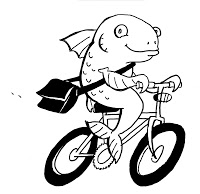 Since she lost my father as her “tool,” she transferred the responsibility to me. She is not independent as a man would be. I’m not upset about it. It is the natural order of life. And since she didn’t stuff me into daycare to have strangers raise me, but rather did a good job for me as a true mother when I was young… and because she did not selfishly destroy our family with divorce, but stayed with my father for 48 years (and I’m sure not all of those years were easy ones), I am willing to let her use me as her “tool” in her old age because she deserves it.
Since she lost my father as her “tool,” she transferred the responsibility to me. She is not independent as a man would be. I’m not upset about it. It is the natural order of life. And since she didn’t stuff me into daycare to have strangers raise me, but rather did a good job for me as a true mother when I was young… and because she did not selfishly destroy our family with divorce, but stayed with my father for 48 years (and I’m sure not all of those years were easy ones), I am willing to let her use me as her “tool” in her old age because she deserves it. 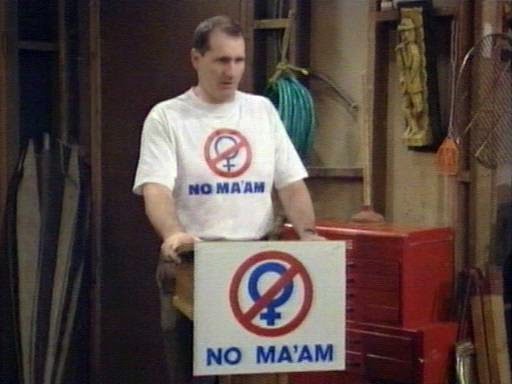 because we are not asserting our authority and telling women, “NO! You can’t use me as your tool for free. We are humans, not monkeys.” And since men’s love is “the host” for women’s “parasitic love,” it is essential that the host leads the parasite, rather than the other way around. When the parasite leads, it destroys both the host and the parasite, but when the host leads, both organisms can survive.
because we are not asserting our authority and telling women, “NO! You can’t use me as your tool for free. We are humans, not monkeys.” And since men’s love is “the host” for women’s “parasitic love,” it is essential that the host leads the parasite, rather than the other way around. When the parasite leads, it destroys both the host and the parasite, but when the host leads, both organisms can survive.
NO! Learn to say it, and learn to say it often.
You don’t even have to be rude about it. You could also say “NO MA’AM!“
Women are as independent as a tropical fern in a greenhouse in Iceland.
If the men “leave” the women will follow, because female “independence” is an illusion.
 Mothers appear to be more fond of their sons, because those sons are able to help them, and fathers of their daughters, because daughters need their help. Maybe also it is out of compliment to each other that both parties desire to be seen making much of that which is more akin to the other. This, perhaps, is a trait of no importance, but there is another which is charming. I mean, when the wife’s respect is seen to incline rather to the husband’s parents than to her own, and when,
Mothers appear to be more fond of their sons, because those sons are able to help them, and fathers of their daughters, because daughters need their help. Maybe also it is out of compliment to each other that both parties desire to be seen making much of that which is more akin to the other. This, perhaps, is a trait of no importance, but there is another which is charming. I mean, when the wife’s respect is seen to incline rather to the husband’s parents than to her own, and when,  in case of anything troubling her, she refers it to them and conceals it from her own people. If you are thought to trust, you are trusted; if you are thought to love, you are loved. — Advice to Married Couples, by Plutarch
in case of anything troubling her, she refers it to them and conceals it from her own people. If you are thought to trust, you are trusted; if you are thought to love, you are loved. — Advice to Married Couples, by Plutarch







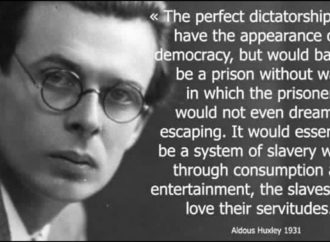


















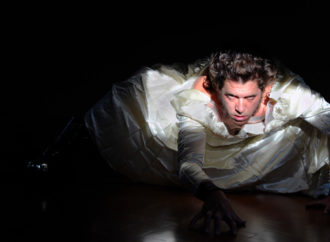





Leave a Comment
Your email address will not be published. Required fields are marked with *